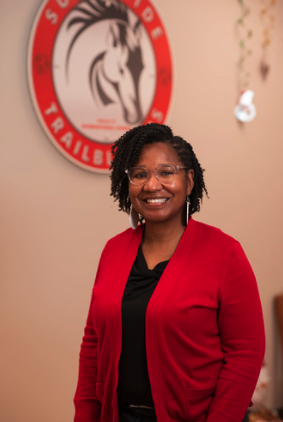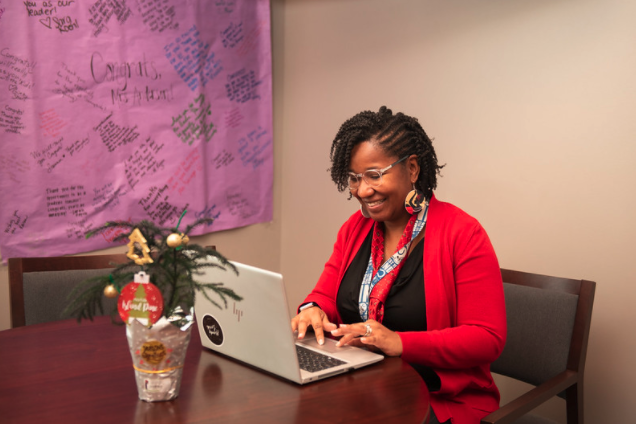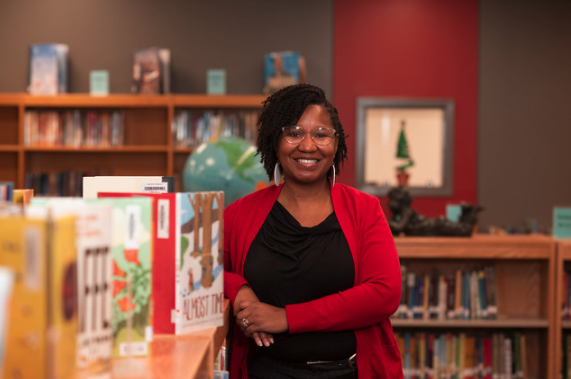Lawrence Township School Board Names New Director of Elementary Education
Photographer / Amy Payne
 Tierney Anderson, a lifelong educator, has always been a bit of a cheerleader, as she relishes seeing greatness in students. It’s difficult, however, when students don’t see the potential in themselves. That’s where the cheerleading comes into play.
Tierney Anderson, a lifelong educator, has always been a bit of a cheerleader, as she relishes seeing greatness in students. It’s difficult, however, when students don’t see the potential in themselves. That’s where the cheerleading comes into play.
“If you believe you can’t, you probably won’t because you won’t even try,” says Tierney Anderson was recently named the new director of elementary education by the Metropolitan School District of Lawrence Township. If you are asking “What is a Metro District,” the answer is that the district serves 16,000 students across all schools. Anderson oversees the 11 elementary schools and is in charge of elementary academics, curricula, attendance, discipline issues and parent concerns.
Anderson, whose teaching experience ranges from third grade to high school calculus, has always encouraged her students to go for it, whatever “it” is, because doing so breeds success. It’s advice she followed herself when she decided to go back to school to earn her Ph.D., which she’ll complete in May of 2021 at Indiana State University.
Though she has worked as a teacher, building leader and assistant principal, she likes the fact that in her current role, she can blend into the background while still offering suggestions, lending a hand, and promoting others so they may reach their goals.
“It’s like being more of a crew member where you build a setup on the back end,” she says. “I love that the schools get all the glory, but there is a lot of work in the background that goes into making those schools successful. Taking this position is just me casting my net wider to influence the 11 elementary schools [in the district] rather than just one.”
Last year was difficult in many ways as teachers, students, parents and administrators all learned to navigate education during a global pandemic. Last spring many were thrown into virtual learning quickly. Staff members scrambled to put together paper packets, as not everyone has access to computers and iPads. Over time, however, team members adjusted, starting with providing teachers with professional development regarding virtual learning.
Keeping teacher morale up has been tricky because many educators want to perfect their lessons before rolling them out. Unfortunately, that’s not possible at this time. Therefore, the administration encourages them to “fail forward” – to try new approaches, and if something doesn’t work, try something else the next day.
 “Day by day, they tweak it,” says Anderson, who likens virtual teaching to a sport that must be practiced. “Sometimes the practices don’t go well, but you still worked hard at it and even though you didn’t do well, you go back to practice tomorrow. You just keep doing it, keep trying, and keep reinventing yourself, because even if you’ve taught for 20 years, you’ve never taught virtually.”
“Day by day, they tweak it,” says Anderson, who likens virtual teaching to a sport that must be practiced. “Sometimes the practices don’t go well, but you still worked hard at it and even though you didn’t do well, you go back to practice tomorrow. You just keep doing it, keep trying, and keep reinventing yourself, because even if you’ve taught for 20 years, you’ve never taught virtually.”
In keeping with orders from the Marion County Public Health Department, the district will continue to engage in virtual learning until January 15, at which point leaders will reevaluate in-person learning. While virtual learning continues, teachers are logged in with students daily, going through lessons as if in-person. In addition, teachers hold office hours so students can seek additional support if needed.
“We want to make sure we don’t lose the integrity of education just because we are not in-person,” says Anderson, noting that the upside of the pandemic is that we, as a country, have developed grit, stamina and flexibility. “We learned that we are not going to know the answer to everything, and that’s OK.”
Another bright spot is a renewed appreciation for teachers.
“To those people who thought of teachers as glorified babysitters, they now understand our purpose and our place,” says Anderson, who recognizes that some ages, grades and personalities have a harder time with virtual learning than others. “Some kids would love to be in front of a computer for hours, while others need to move around quite a bit, so it’s smart to provide structured breaks where students can stand up and do a lap around the table or march in place. In the long run, you’ll get more out of the child when you allow them breaks.”
To help students stay focused and engaged, the district practices both mindfulness and social-emotional learning. Mindfulness involves centering oneself in order to prepare for learning, whereas social-emotional learning teaches students about self-control, respect and tolerance. These practices helped many of us find our way through 2020 – a year that taught us that even the best-laid plans can be thrown out the window in a heartbeat.
“Sometimes it’s best to go with the flow,” Anderson says.
Anderson, the youngest of six siblings, is looking forward to making some plans in 2021 when, hopefully, the landscape looks a bit brighter. She and her husband Johny have two children, Jaren, 12, and Jacey, 9, and they all miss gathering with Anderson’s mom and siblings for Sunday dinners.
“We’re going through withdrawal,” says Anderson, who also eagerly anticipates the return of in-person meetings and interactions. “I can’t wait to visit the schools and actually see the learning that takes place. I’m a hugger, and I like to talk.”






